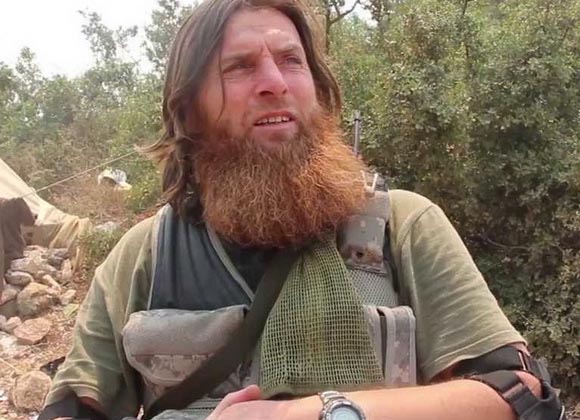
In New Video, Georgian-Born Muslim al-Shishani Discusses Russian Presence in Syria
Publication: Eurasia Daily Monitor Volume: 13 Issue: 99
By:

Muslim al-Shishani is the nom de guerre of Murad Margoshvili, commander of the Junud al-Sham (“Soldiers of Syria”) insurgent group operating in Syria. Margoshivili is a Georgian national, but he is also an ethnic Kist, a member of the Chechen sub-ethnic group that lives in Georgia’s Pankisi Gorge. Margoshvili went to Syria to help the rebels in 2012, establishing Jund al-Sham. Russia’s Federal Security Service (FSB) accuses Margoshvili of many crimes, including participation in illegal armed groups and attacks on government forces. The US State Department has put Margoshvili on its list of individuals designated as foreign terrorists or terrorist facilitators and subject to sanctions (State.gov, September 24, 2014).
It is unclear what information the State Department based its decision upon to put Margoshvili’s group on the terrorism list. It is well known that Margoshvili’s group, since its inception, has not been allied with the Islamic State, al-Nusra Front (al-Qaeda’s affiliate in Syria), or any other local group in Syria. Junud al-Sham preferred to operate on its own. It is a puzzle as to how the group has survived operating autonomously in a foreign country with a commander who does not speak Arabic and continues to attract new recruits primarily from European countries.
Junud al-Sham is based in Latakia, as it has been since Margoshvili founded the group back in 2012. Since its spokesperson comes from Germany, the group’s recruitment program is primarily oriented toward that country. Germany is one of the largest suppliers of recruits for the Islamic militants in Syria. For example, at the end of 2014, the authorities reviewed 40 cases of people from just one German city who had gone on to fight in Syria (Faz.net, December 8, 2014).
Muslim al-Shishani is one of the few Chechen commanders in the Middle East who engages in public campaigning, giving frequent interviews and posting videos that show him fighting alongside his troops in the war against Syrian President Bashar al-Assad’s army (Chechensinsyria.com, January 12). He recently gave an interview that touched on the Russian presence in Syria. A week before the interview, he announced six questions via Twitter that he would seek to answer (Twitter.com/JunudS_RU, May 9). On May 15, he unveiled the answers to three of the questions he had promised to address. The first question was: “What are Russia’s political strategy and tactics, as a world power?” In a nine-minute response, al-Shishani said that while Russia was resolving the Chechen question after the fall of the Soviet Union in 1991, the United States and other Western countries managed to free several former Soviet states of subordination to Russia. The Kremlin then realized that Russia’s influence had shrunk to a minimum. Moreover, Muslim al-Shishani accused Russia of pursuing Russification policies against the small ethnic groups that reside on its territory. He said that the difference between Russia and the US is that the latter allows countries to remain independent to an extent while Russia wants to control everything directly, which makes its relations with other countries colonial rather than based on alliances. Thus, he said, Muslims often prefer the US as an ally rather than Russia, even though Islam does not envisage such choices. According to Muslim al-Shishani, Russia attacked Ukraine and annexed Crimea in order to prove that it is still a world power, even though little is left of Moscow’s global influence (YouTube, May 15).
Muslim al-Shishani’s second question was: “Why did Russia withdraw its troops from Syria?” In a five-and-a-half minute response, he said that upon arriving in Syria, he saw that “Alawites” (Assad’s supporters) lived in villas, Christians lived in well-furnished apartments while Sunnis lived in slums. He compared al-Assad’s policies to the policy of the Communists in the Soviet Union, which resulted in a revolt by the Sunnis. The Russians failed to take the opportunity to show that they can become full-fledged players in the Arab world, and quickly realized that they could not take over all of Syria regardless of the amount of support they provided to al-Assad, he said. Thus according to Muslim al-Shishani, the Russians will support dividing the country, leaving the Alawites in control of Syria’s coastal areas (YouTube, May 15).
The third question was: “Did the Mujahedeen defeat the Russians or leave after achieving their goals?” In an answer that lasted eleven-and-a-half minutes, he talked about the conflicts among the militants in Syria. He said that the declaration of the so-called Islamic State in Syria, as well as the Caucasus Emirate in Chechnya in 2007, was done in violation of Sharia norms. According to the militant, the Russians did not withdraw their troops from Syria but, on the contrary, were fortifying their positions there (YouTube, May 16).
Muslim al-Shishani’s interview was essentially about nothing and was interesting only in regard to his view of the situation in Syria. The militant made no clear statement about the Russian presence in Syria or about the attitude of the Chechens toward that presence. It remains to be seen what al-Shishani will say in response to the other three questions that he was asked. Hopefully, his answers to those questions will be more interesting than his responses to the first three.



